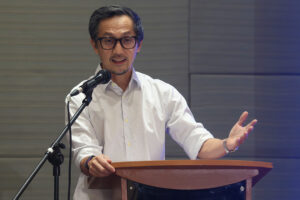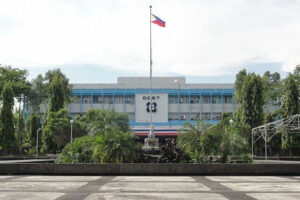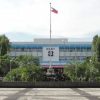PHILIPPINE DEFENSE Secretary Gilberto C. Teodoro, Jr. on Wednesday urged Congress to amend the military’s modernization program, hinting at the need for greater agility as equipment becomes outdated more quickly in modern warfare.
“The challenge isn’t just traditional threats anymore,” he said in a panel discussion in Filipino. “We now face asymmetric and hybrid threats, like cyberattacks and others.”
“We know that equipment becomes obsolete in a much shorter time,” he added.
The Philippines has launched a sweeping $35-billion, or around P2 trillion, military modernization program aimed at bolstering its defense capabilities over the next decade, including the acquisition of advanced naval vessels, planes and missile systems, as it pushes back against China’s military might in the region.
The South China Sea has become a regional flashpoint as Beijing continues to assert sovereignty over almost the entire sea, a vital global trade route that is believed to be rich in undersea gas and oil deposits.
Manila and Beijing have repeatedly locked horns over maritime features that both nations claim in the contested waterbody, leading to confrontations that involve the use of water cannons and repeated sideswipes by Chinese vessels against Philippine ships.
A United Nations-backed tribunal voided China’s expansive claims in 2016. Beijing, however, has rejected the ruling and continues to increase its presence in the disputed area.
Mr. Teodoro said that modern warfare has shown that materiel is becoming obsolete at an accelerating pace due to technological advancements and the use of artificial intelligence (AI) in military surveillance.
“What they used to call Moore’s Law – where cyber technology became obsolete every two years – no longer applies. In some conflict areas today, changes happen every three months,” he said. “Artificial intelligence now enables adversaries to immediately pinpoint your capabilities.”
Meanwhile, Armed Forces of the Philippines Chief-of-Staff General Romeo S. Brawner, Jr. said the military is enhancing its cyberwarfare capabilities, as he described cyberspace as a new frontier for conflict.
“We are continuously updating and upgrading our cyber systems, because we have seen that one of the emerging forms of warfare is what we call cyberwarfare,” he said in the same forum in Filipino.
“That’s why we’re strengthening this capability — because we know that Filipinos are truly skilled, talented and excellent in cyber. We will harness this not only to defend our country, but, if necessary, to be on the offense,” he added.
Bolstering cyber defense capabilities has become increasingly vital for the Southeast Asian nation as Beijing allegedly escalated state-sponsored attacks since last year, according to a report by US-based cybersecurity company CrowdStrike.
“The underlying motivation is likely China’s desire for regional influence in the nation’s near abroad,” it said in its 2025 report.
ISRAEL FTAMeanwhile, Manila’s potential free trade agreement (FTA) with Tel Aviv is seen benefiting not just the Philippines’ agriculture and health sector, but also security industries, Israel’s minister of economy said.
“The one that I believe is very attractive to collaborate with the Philippines is agritech, food tech and aqua tech and that’s creating food from the sea, improving the yield of the farmers, creating more healthy food, better food,” Israel Minister of Economy and Industry Nir Barkat told reporters on Tuesday evening.
“These are things we have over 750 companies and startups in Israel that focus on export and bringing new innovation to the world,” he added.
Israel’s private sector has investments in local agriculture and water treatment projects, among other ventures.
He added that his country’s health and life sciences industry could potentially invest in the Philippines.
“Israel has 2,000 companies and startups in the area of health life sciences. A lot of digital new innovation, AI based applications that are looking at the future of medicine, precision medicine,” he said.
Mr. Barkat added that Israel also specializes in cybersecurity and homeland security, where the Manila and Tel Aviv could collaborate.
“We collaborate very well together on helping our friends defend themselves and the Philippines is certainly a friend of Israel,” he said.
Earlier that day, the Philippines and Israel agreed to conduct negotiations on a potential FTA between the two countries after a joint committee meeting between Philippine Trade Secretary Ma. Cristina A. Roque and the Israeli minister.
“Because we have good people-to-people [relations] between the Filipinos and Israelis, and good government-to-government [ties], in my mind it’s just a matter of time that we process a free trade agreement, and we’ve made the first steps,” Mr. Barkat said.
In 2024, trade between the Philippines and Israel amounted to $400.42 million, making Israel the country’s 34th largest trading partner.
Net foreign direct investment from Israel hit P45.94 million last year, making it the Philippines’ 20th largest source of FDI.
“We want to go to zero taxes on both sides. We want to have what the entrepreneurs business people on both sides want, that business flows from one side to the other where there are no obstacles,” he added.
He said that delegates from both countries are now consulting with businesses to define certain problems and obstacles hindering trade.
“The two governments will now have to get into the agreement and remove obstacles to enable the business community to do swift and better business together,” he added. — Kenneth Christiane L. Basilio and Adrian H. Halili


















